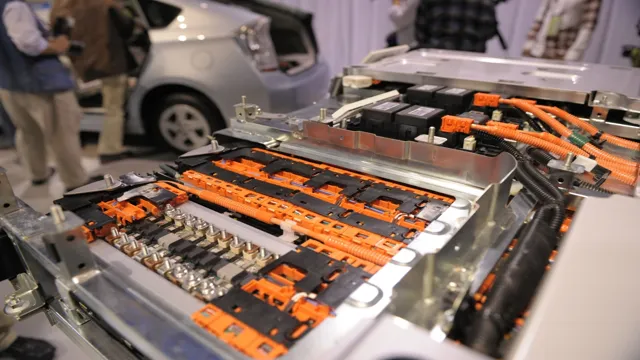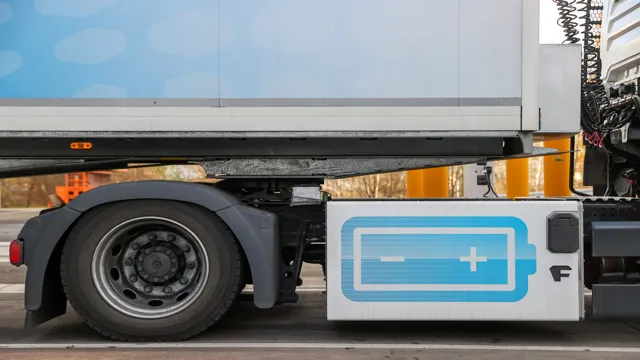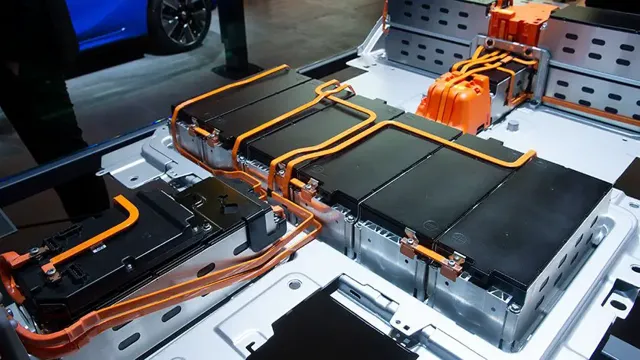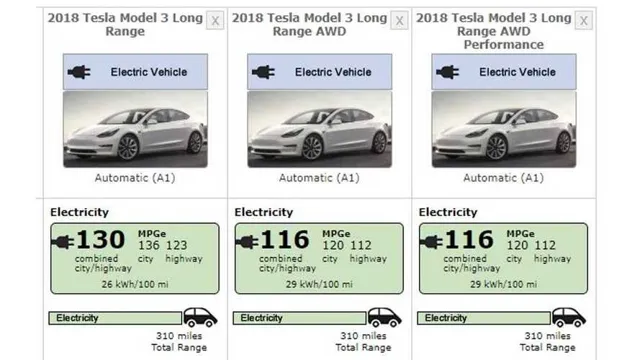The Shocking Truth behind Electric Car Lithium-Ion Battery Cost: How to Save on Your Eco-Friendly Ride
Electric cars are a hot topic these days. With the growing concern for the environment, more and more people are interested in the benefits of electric cars. One of the most significant benefits, of course, is that electric cars don’t use gasoline.
But what about the cost of the batteries that power them? Lithium-ion batteries are the most common type of battery used in electric cars, and they can be expensive. So, what is the price of these batteries, and how does it affect the overall cost of owning an electric car? The price of a lithium-ion battery can vary depending on a range of factors such as battery capacity, brand, and the vehicle it is meant for. However, one thing is certain: the cost of lithium-ion batteries has been decreasing over the years.
This is mainly due to advances in technology and the economies of scale that come with increased production. The prices of lithium-ion batteries are now at a point where they are comparable to the cost of an internal combustion engine’s fuel system, taking into account fuel costs and maintenance. Additionally, governments around the world offer incentives for people who choose to buy electric vehicles, which helps offset the cost of the battery.
While the initial cost of an electric car may still be higher than that of a traditional gasoline car, the cost savings over the life of the vehicle can be significant. Electricity costs are generally much lower than gasoline costs, and electric cars require far less maintenance. The decreasing cost of lithium-ion batteries is making electric cars more affordable, and as more people buy them, the cost of owning one will continue to decrease.
So, whether you’re already a proud electric car owner or are just considering making the switch, you can rest easy knowing that the price of lithium-ion batteries is becoming more and more affordable. While it may still be a significant investment upfront, the long-term savings and environmental benefits are well worth it.
Understanding Lithium-Ion Batteries
Electric cars are becoming increasingly popular as people seek to reduce their carbon footprint and save money on gas. One of the key components in an electric vehicle is the lithium-ion battery, which stores energy for the car to use. But what affects the price of these batteries? One factor is the size of the battery – larger batteries will cost more.
Another factor is the materials used to make the battery. Lithium-ion batteries require certain rare metals, which can be expensive to obtain. Finally, research and development costs can also impact the price of lithium-ion batteries.
As demand for electric vehicles continues to grow, it is likely that the cost of lithium-ion batteries will decrease, making electric cars more affordable for everyone.
Composition and Cost Factors
Lithium-Ion batteries are versatile energy storage devices that are commonly used in electronic devices such as cell phones, laptops, and electric cars. They are composed of several key components, including an anode, cathode, electrolyte, and separator. The anode is typically made up of graphite, while the cathode can be made from a variety of materials such as cobalt, nickel, and manganese.
The electrolyte, which acts as a conductor, is usually a lithium salt dissolved in an organic solvent. The separator prevents the two electrodes from coming into contact and causing a short circuit. The cost of lithium-ion batteries can vary depending on several factors, including the type of materials used, production volume, and market demand.
As technological advancements continue to improve the performance and lifespan of these batteries, it is likely that they will become even more ubiquitous in our daily lives.

Average Prices of Lithium-Ion Batteries
Lithium-ion batteries are widely used in various electrical devices, from smartphones to electric cars, owing to their high energy density and long-lasting performance. These batteries consist of an anode, cathode, electrolyte, and separator, and are rechargeable. The average price of lithium-ion batteries varies depending on the type and size of the unit, the manufacturer, and the purpose.
For instance, the prices of Lithium-ion batteries used in automobiles are higher than those used in smartphones, due to their more extensive size and capacity requirements. On average, the cost of lithium-ion batteries has substantially declined over the years, owing to technological advancements, increased demand, and production efficiencies. The prices have dropped from roughly $1,100 per kWh in 2010 to $137 in 2020, making it possible to develop affordable electric vehicles and portable electronic devices.
Despite the falling prices, the cost of producing high-performance lithium-ion batteries is still relatively expensive, and manufacturers continue to invest in research and development to improve efficiency, safety, and sustainability.
Factors that Affect Electric Car Battery Price
Electric car lithium-ion battery prices can vary depending on a wide range of factors. First, the size of the battery is likely to be a significant factor, as larger batteries require more materials and resources to produce. Secondly, the brand of the battery can also affect the price.
Some brands may be more expensive due to their reputation or the quality of the materials used in the construction of the battery. Thirdly, advances in technology and production methods can also impact the price of lithium-ion batteries. As new advancements are made, older batteries may become less expensive, while newer batteries may remain at a higher price point.
Finally, demand for electric cars can also play a significant role in the price of their batteries. As the demand for electric cars increases, so too does the demand for lithium-ion batteries, resulting in a potentially higher price point. Overall, lithium-ion electric car batteries can be influenced by a range of factors, and it is essential to keep these factors in mind when considering purchasing an electric car.
Battery Capacity and Range
When it comes to electric cars, one of the main factors that affects battery price is capacity. The larger the battery capacity, the more expensive it will be. This is because a larger battery requires more materials and resources to produce.
Another factor that can affect battery price is the range that the battery can provide. A battery with a longer range will typically be more expensive, as it requires more capacity and technology to achieve. However, it’s important to note that while a bigger battery and longer range may come with a higher price tag, they can also provide significant benefits.
For example, a larger battery can provide a longer driving range and more power for acceleration. Ultimately, it’s up to the individual to decide what their priorities are and whether the added cost for more battery capacity and range is worth it for them.
Brand and Model of Vehicle
When it comes to purchasing an electric car, the brand and model can play a significant role in determining the battery price. Some brands offer higher-end models with more advanced battery technology, which can be reflected in the price. Additionally, larger and heavier vehicles may require larger and more expensive batteries to provide enough power.
Another factor that can affect the battery price is the age of the vehicle. Older electric cars may have outdated battery technology that is less efficient and more expensive to replace. It is essential to keep these factors in mind when considering the cost of an electric car battery.
Ultimately, doing research and comparing prices and features can help you find the best electric car battery option for your needs. So, whether you are looking for a high-end or more budget-friendly option, always consider brand and model when looking at electric car batteries.
Availability and Supply Chain
Electric car battery prices are influenced by various factors, one of which is availability and supply chain. The production of electric car batteries requires rare and expensive materials such as lithium, cobalt, and nickel, which can be impacted by supply chain disruptions and limited availability. Additionally, the demand for electric vehicles is continuously increasing, creating a surge in demand for batteries.
This burstiness can cause price fluctuations in the short term. However, as the production of batteries continues to increase, prices are expected to decrease due to economies of scale. Another factor is the development of newer and more advanced battery technologies that can improve performance and reduce costs.
As the industry continues to evolve and innovate, it is expected that prices will become more affordable, making it more accessible for people to shift to electric vehicles.
Latest Trends and Predictions
Electric cars have become increasingly popular in recent years due to their environmental benefits and cost-effectiveness in the long run. One of the main components of an electric car is the lithium-ion battery, which accounts for a significant portion of the vehicle’s cost. However, as technology advances and demand for electric cars grows, the price of lithium-ion batteries is expected to drop.
In fact, experts predict that the cost of lithium-ion batteries will continue to decrease by around 7% per year, making electric cars more affordable for consumers. Additionally, advancements in battery technology are likely to increase the range and efficiency of electric vehicles. With these trends and predictions, it’s clear that the future of electric cars is bright, and they will likely become even more accessible and commonplace in the coming years.
Decreasing Prices over Time
When it comes to the decreasing prices over time, there are a few latest trends and predictions to keep in mind. One trend that we have seen over the past few years is the increasing popularity of online shopping. As more and more people make purchases online, retailers are able to offer lower prices as they are saving on overhead costs.
Another trend that has contributed to decreasing prices is the rise of technology and automation in manufacturing. With more advanced machinery and robots, companies can produce goods at a lower cost, leading to lower prices for consumers. Looking ahead, there are a few predictions for further decreases in prices.
One area to watch is renewable energy. As technology improves and becomes more widely adopted, it is expected that the cost of renewable energy sources, such as solar and wind power, will continue to decrease. This will lead to lower energy costs for both businesses and consumers, ultimately lowering the cost of goods and services.
Another area to keep an eye on is the sharing economy. As peer-to-peer services such as Airbnb and Uber become more popular, traditional businesses are feeling the pressure to lower their prices to compete. This trend is expected to continue, leading to lower prices for consumers in various industries.
In conclusion, there are several factors contributing to the decreasing prices we are seeing in today’s economy. As technology continues to advance and new trends emerge, we can expect to see even more price decreases in the future. By keeping up with these trends and predictions, consumers can make more informed purchasing decisions and take advantage of lower prices.
Impact of New Technologies
The impact of new technologies on various industries has been nothing less than revolutionary. With advancements in artificial intelligence, machine learning, and automation, businesses are embracing the latest trends to streamline processes, improve efficiency, and stay ahead of the competition. For example, the use of chatbots to handle customer inquiries has been on the rise, freeing up human operators to focus on more complex tasks.
The healthcare industry has embraced digital technologies to improve patient outcomes, with the use of telemedicine and remote monitoring tools becoming more prevalent. Looking ahead, it is predicted that blockchain technology will revolutionize the finance industry and the way transactions are recorded and processed. As we continue to advance technologically, the possibilities for innovation and disruption are endless.
It is exciting to see what the future holds as we explore the latest trends and predictions in technology.
Conclusion and Recommendations
Well folks, it seems that the price of electric car lithium-ion batteries is shockingly high. But don’t worry, we can’t jolt the market into change overnight. We’ll just have to amp up our investments in renewable energy and hope that economies of scale kick in.
In the meantime, let’s all charge ahead and drive the change we wish to see!”
FAQs
What is the average cost of a lithium-ion battery for an electric car?
The average cost of a lithium-ion battery for an electric car is currently around $10,000 to $15,000.
How long do lithium-ion batteries typically last in an electric car?
On average, lithium-ion batteries in electric cars can last between 8 to 10 years.
Are there any government incentives for buying an electric car with a lithium-ion battery?
Yes, many governments offer incentives such as tax credits or rebates for purchasing an electric car with a lithium-ion battery.
Can you recharge a lithium-ion battery at home?
Yes, most electric cars with lithium-ion batteries can be recharged at home using a standard outlet or a specialized charging station.






